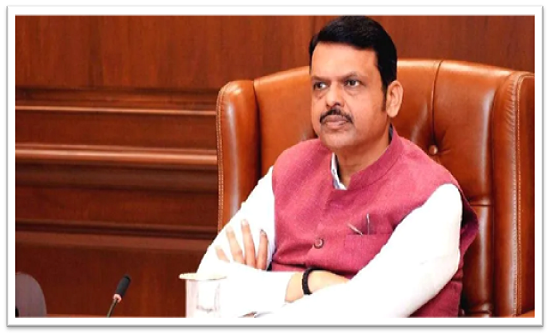
Maharashtra CM Devendra Fadnavis Convenes Urgent Strategy Meeting on Flood Response and Agricultural Relief
Maharashtra is grappling with the aftermath of heavy monsoon rains that have caused widespread flooding and significant agricultural damage. In response to the escalating situation, Chief Minister Devendra Fadnavis has convened an urgent meeting of Mahayuti ministers to review flood management, crop losses, public health concerns, and preparations for the upcoming local body elections.
The initiative reflects a proactive governance approach, combining crisis management with strategic planning. The meeting, scheduled immediately after the Cabinet session, will bring together senior leaders from Mahayuti’s constituent parties to ensure a coordinated response across administrative and political fronts.
Coordinated Governance in Response to Monsoon Impact
According to sources in Mantralaya, CM Fadnavis has emphasized the presence of all ministers and senior party leaders, underscoring the urgency of the situation. The meeting aims to align governmental priorities, streamline relief operations, and communicate a unified strategy to affected districts.
This collaborative approach reflects the administration’s focus on data-driven decision-making and inter-departmental coordination. By addressing flood management, crop relief, public health, and electoral preparedness simultaneously, the state government seeks to balance immediate humanitarian needs with long-term socio-economic stability.
Agricultural Losses Across the State
Monsoon-induced flooding has affected more than 60 lakh hectares of farmland across 33 districts, with Marathwada experiencing particularly severe damage. Farmers in the region face distress from crop destruction, disrupted irrigation, and delayed sowing cycles, threatening both short-term income and long-term agricultural productivity.
The economic impact is substantial, with losses spanning staple crops, cash crops, and horticultural produce. The situation demands a comprehensive assessment of damage, rapid deployment of relief resources, and policy measures to safeguard farmer livelihoods. By highlighting crop loss at the core of the discussion, the meeting underlines the government’s recognition of agriculture as the backbone of Maharashtra’s rural economy.
Public Health Concerns Post-Flooding
Beyond agricultural loss, floods exacerbate public health risks, including waterborne diseases and vector-borne illnesses. Health experts anticipate a rise in post-flood ailments, particularly in low-lying and densely populated areas. The meeting is expected to review preventive measures such as vaccination drives, sanitation campaigns, and rapid-response medical teams.
This dual focus on agriculture and public health demonstrates a holistic understanding of disaster impact, moving beyond immediate relief to long-term resilience and community well-being. By integrating health strategies into flood response planning, the government positions itself as responsive and proactive in safeguarding citizen welfare.
Political and Electoral Considerations
Amid growing farmer distress, opposition parties have intensified their calls for a comprehensive farm loan waiver, organizing rallies, meetings, and state-wide tours to advocate for relief. CM Fadnavis’ meeting is set to review the government’s policy stance and outline a coherent counter-strategy, ensuring that public communication, relief initiatives, and administrative action are synchronized.
The inclusion of electoral considerations reflects a nuanced approach: balancing immediate relief with strategic governance, while maintaining focus on effective public service and electoral accountability. By addressing opposition campaigns constructively, the administration seeks to demonstrate both responsiveness and leadership in times of crisis.
Policy Decisions and Relief Measures
During the meeting, key policy decisions are expected to include: assessment of crop damage, disbursement of financial assistance, and deployment of agricultural support services such as seed distribution and irrigation repair. Discussions will also focus on long-term flood mitigation strategies, including improved drainage systems, resilient crop planning, and community-based disaster preparedness initiatives.
The state’s leadership aims to ensure that relief measures are efficient, transparent, and sustainable, providing immediate support to affected farmers while building resilience against future monsoon-related disruptions. By structuring response plans along these lines, the administration demonstrates a forward-looking governance model, integrating crisis management with developmental foresight.
Constructive Approach to Opposition Demands
While acknowledging the opposition’s call for loan waivers, the government is poised to evaluate actionable, fiscally responsible measures that balance farmer welfare with economic sustainability. The meeting will likely define both immediate financial support and medium-term policy solutions to mitigate distress without compromising fiscal stability.
This analytical, solution-oriented approach highlights the importance of data-driven policymaking, enabling the government to respond to both natural disasters and political pressures in a structured and credible manner.
Looking Ahead: A Resilient Maharashtra
The urgent meeting called by CM Fadnavis underscores the Maharashtra government’s commitment to proactive crisis management. By integrating flood response, agricultural relief, public health initiatives, and political strategy into a single forum, the administration demonstrates leadership, coordination, and strategic foresight.
As the monsoon continues to challenge the state, the outcomes of this meeting will be critical in ensuring that farmers receive timely support, communities remain protected, and governance remains transparent and accountable. Through decisive action and collaborative planning, Maharashtra is working to turn a period of crisis into an opportunity for resilient growth and responsive governance.





